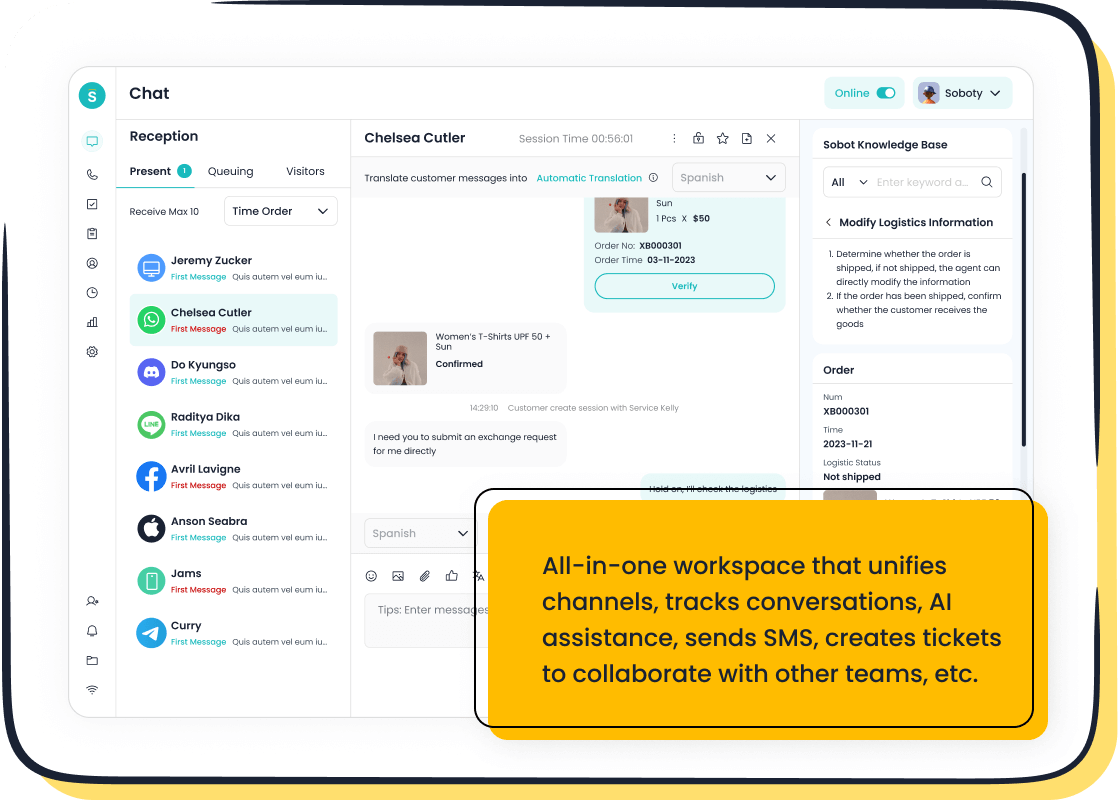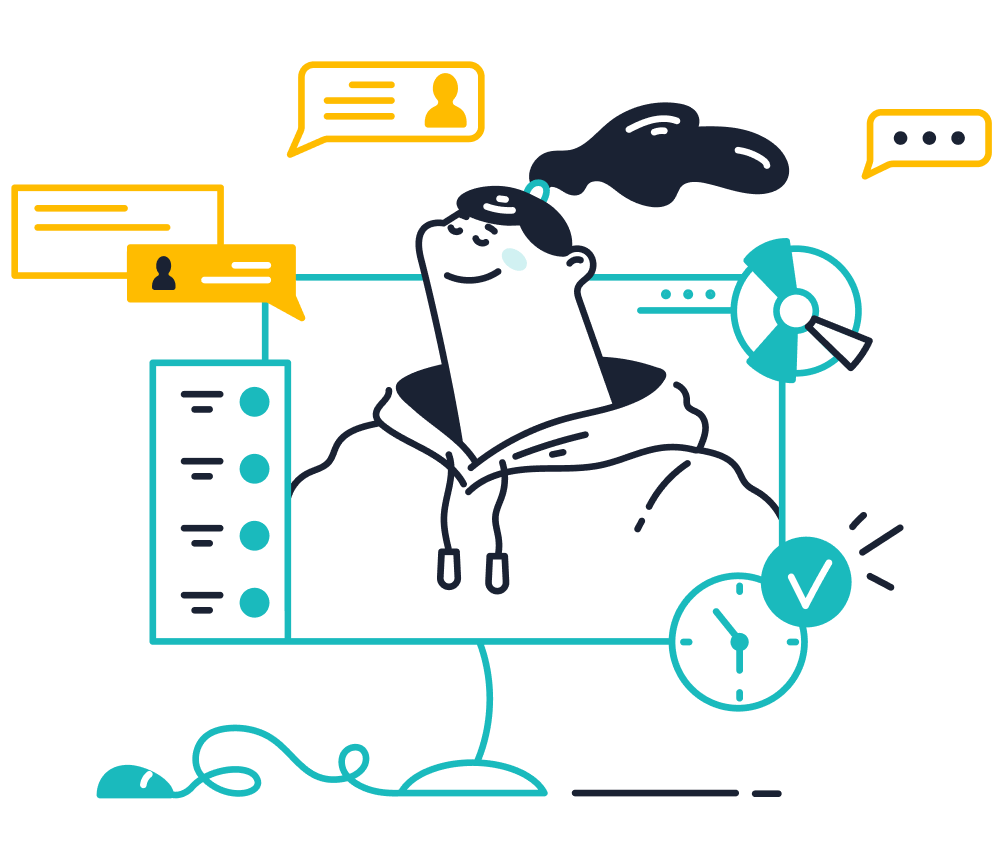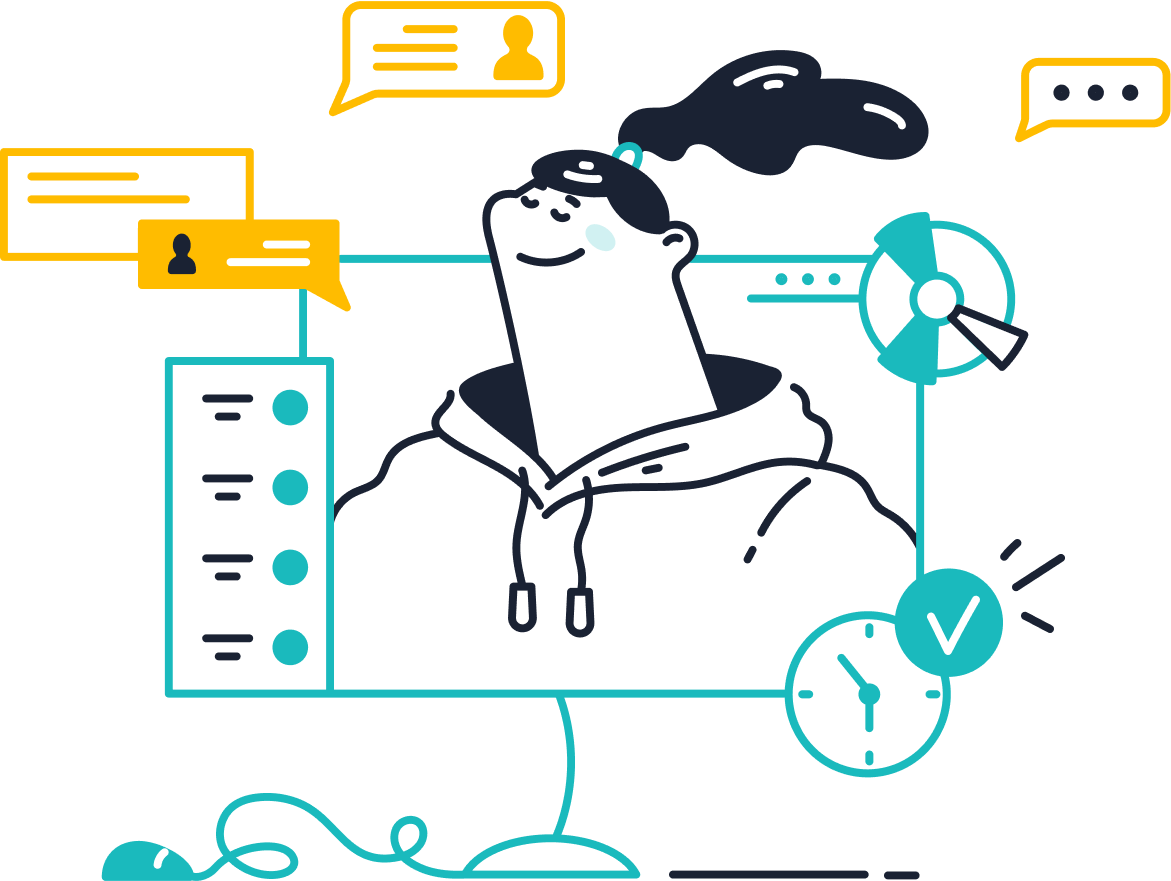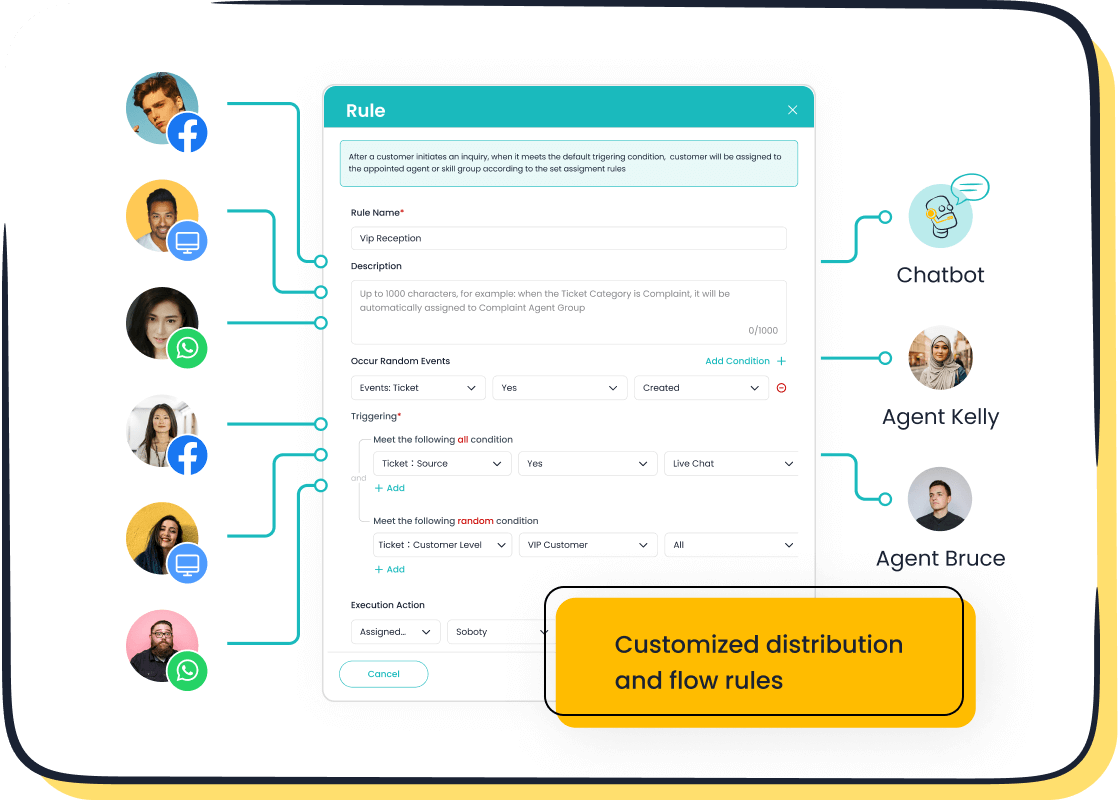Why Chat Interfaces Are Vital for Modern Applications

Chat interfaces have become a cornerstone of modern applications, transforming how users interact with systems. These tools enable seamless communication, making interactions more intuitive and efficient. For example, the chatbot market is projected to reach $543.65 million by 2026, growing at a 19.5% CAGR. This rapid adoption reflects their value in enhancing customer satisfaction and engagement.
Personalized, real-time exchanges through conversational apps not only improve user experiences but also foster brand loyalty. Platforms like Sobot integrate AI-driven tools with messaging systems to deliver tailored conversations, ensuring every interaction feels relevant and impactful. By bridging the gap between users and technology, chat interfaces redefine digital communication.
Understanding Chat Interfaces in Modern Applications
What Is a Chat Interface?
Definition and Core Features
A chat interface is a digital tool that facilitates real-time communication between users and systems. It serves as a bridge, enabling seamless interactions through text, voice, or hybrid formats. Modern chat interfaces prioritize user-friendly designs to enhance satisfaction and usability. Key features include intuitive input fields, easily accessible send buttons, and visually distinct message bubbles. These elements ensure smooth conversations, whether in one-on-one or group settings.
| Characteristic | Description |
|---|---|
| User-friendly design | Essential for enhancing user experience and satisfaction with the application. |
| Input fields | Must be easily accessible and allow for multiline editing to improve message composition. |
| Send button | Should be intuitive, allowing users to send messages easily without excessive clicks. |
| Message bubbles | Help distinguish messages in group chats, often using different colors for sender and receiver. |
| Timestamps | Provide context for messages, helping users understand the timing of conversations. |
| Avatars/profiles | Add a personal touch, making it easier to identify participants in group chats. |
| Typing indicators | Indicate when the other person is typing, enhancing the interaction experience. |
Types of Chat Interfaces (Text, Voice, and Hybrid)
Chat interfaces come in three primary types: text-based, voice-enabled, and hybrid. Text-based interfaces dominate conversational apps, offering simplicity and accessibility. Voice-enabled interfaces, powered by AI, allow users to interact through spoken commands, making them ideal for hands-free scenarios. Hybrid interfaces combine both, providing flexibility and catering to diverse user preferences.
The Role of Conversational User Interfaces
Bridging Human-Software Interaction
Conversational user interfaces revolutionize how you interact with applications. Unlike traditional menu-based systems, they enable natural conversations through text or voice commands. This fosters real-time engagement and context-aware interactions, making the experience more intuitive and human-like. For example, a conversational app can guide you through a product purchase by understanding your preferences and providing tailored recommendations.
Enhancing Accessibility and Usability
Conversational user interfaces excel in accessibility. They cater to users with diverse needs, offering screen reader compatibility and alternatives to voice inputs. This inclusivity ensures that everyone, including those with disabilities, can access services effortlessly. By prioritizing accessibility, conversational apps create a more inclusive and engaging user experience.

Sobot Live Chat: A Comprehensive Solution
Omnichannel Support for Seamless Communication
Sobot Live Chat stands out as a robust solution for modern applications. It supports omnichannel communication, allowing you to interact with customers across websites, apps, and social media platforms like WhatsApp and Instagram. This ensures no missed conversations, as all interactions are unified in one workspace. With Sobot Live Chat, businesses can meet customers where they are, enhancing engagement and satisfaction.

AI-Enhanced Tools for Efficiency
Sobot Live Chat integrates AI-powered tools to boost efficiency. Features like intelligent assignment and auto-translation streamline workflows, enabling agents to focus on meaningful conversations. Built-in analytics evaluate over 150 indicators, helping businesses make data-driven decisions. These tools not only improve service quality but also drive higher conversion rates, making Sobot Live Chat an indispensable tool for customer engagement.
Key Benefits of Chat Interfaces for Customers
Enhancing User Engagement
Real-Time Interactions and 24/7 Availability
Chat interfaces revolutionize how you interact with businesses by offering real-time messaging and round-the-clock availability. These features ensure that your questions are answered instantly, no matter the time or day. For example, conversational apps powered by AI can simulate human-like conversations, making interactions feel natural and engaging. Advanced Natural Language Processing (NLP) enhances this experience by understanding your intent and providing accurate responses. This level of accessibility fosters trust and keeps you connected to the services you need.
Building Stronger Customer Relationships
Personalization plays a key role in building stronger relationships. Chat interfaces can address you by name and remember past interactions, creating a sense of familiarity. This tailored approach makes conversations more enjoyable and relevant. For instance, when a messaging platform recalls your preferences, it can offer recommendations that align with your needs. These small but impactful gestures enhance engagement and strengthen your loyalty to the brand.
Improving Scalability and Efficiency
Handling High Volumes of Customer Requests
Businesses often face challenges in managing large volumes of customer inquiries. Chat interfaces excel in handling these demands efficiently. AI-powered chatbots automate routine tasks like data entry and order processing, ensuring faster resolutions. They also integrate seamlessly with business systems like CRM and ERP, enabling consistent information flow. This scalability allows businesses to serve more customers without compromising on quality.
| Feature | Benefit |
|---|---|
| Automation of Routine Tasks | Speeds up processes like order tracking and data updates. |
| 24/7 Support | Ensures constant availability, improving customer satisfaction. |
| System Integration | Provides agents with quick access to customer data for better service. |
Reducing Operational Costs with Automation
Automation significantly reduces operational costs. By delegating repetitive tasks to chatbots, businesses can allocate human agents to more complex issues. This not only improves efficiency but also enhances the overall customer experience. For example, Sobot Live Chat uses AI tools like intelligent assignment to streamline workflows, ensuring that your concerns are addressed promptly and effectively.
Personalization and Tailored Experiences
Leveraging Data for Customized Responses
Chat interfaces leverage data to deliver personalized experiences. By analyzing your preferences and history, they provide responses that feel tailored to your needs. This approach ensures quicker resolutions and creates a more engaging journey. For instance, when you inquire about product availability, a conversational app can instantly provide accurate information, saving you time and effort.

Increasing Conversion Rates with Sobot Live Chat
Sobot Live Chat takes personalization to the next level. Its AI-driven tools analyze customer data to offer precise profiling and tailored services. This strategy has proven to increase conversion rates by 38%, turning visitors into loyal customers. By unifying messaging across platforms, Sobot ensures that every interaction feels seamless and impactful, enhancing customer engagement and driving business growth.
Real-World Applications of Chat Interfaces Across Industries
Customer Service and Support
Chatbots in Call Centers
Chatbots have revolutionized customer support by automating routine tasks and improving efficiency. They handle high volumes of inquiries, such as shipping details or pricing, allowing human agents to focus on complex issues. For example, Slush, an event organization, used chatbots to manage 67% of support requests, increasing conversations by 55%. Chatbots also provide multilingual support, ensuring inclusivity without additional staffing. By integrating with CRM systems, they enhance data analytics, enabling better decision-making and workflow optimization. These features make chatbots indispensable for modern applications, delivering a seamless customer experience.

Sobot's Role in Enhancing Customer Interactions
Sobot Live Chat elevates customer service with its AI-powered tools. It automates routine inquiries, provides instant responses, and supports 24/7 availability. Its intelligent assignment feature ensures that conversations are routed to the right agents, reducing resolution times. By unifying messaging across platforms, Sobot creates a seamless customer experience. Businesses using Sobot have reported improved customer satisfaction and operational efficiency, making it a trusted solution for conversational apps.
E-Commerce and Retail
Personalized Shopping Assistance
In e-commerce, chat interfaces act as personal shopping assistants. They guide you through product selections, offer outfit suggestions, and track orders. For instance, H&M's chatbot helps customers find the perfect outfit while reducing the workload on human agents. AI-powered chatbots also provide 24/7 support, addressing inquiries across time zones. This personalized approach enhances engagement and boosts sales. A Cognigy client experienced a 232% increase in conversions after implementing a retail chatbot, showcasing the potential of conversational apps in driving business growth.
Streamlining Order Management with Live Chat
Chat interfaces simplify order management by providing real-time updates and assisting with returns. They retrieve tracking details and offer estimated delivery dates, ensuring transparency. For example:
| Evidence Description | Support for Query |
|---|---|
| Simplifies transactions and assists with returns | Enhances customer convenience |
| Provides real-time updates on purchases | Streamlines order management |
| Retrieves tracking details and delivery estimates | Improves efficiency |

Sobot Live Chat excels in this area by integrating with business systems, enabling agents to access order details instantly. This integration ensures a seamless customer experience, fostering loyalty and trust.
Healthcare and Telemedicine
Patient Support and Appointment Scheduling
Chat interfaces in healthcare improve patient support by automating appointment scheduling and answering queries. They remind patients about medications and appointments, promoting adherence to treatment plans. For example, chatbots provide 24/7 assistance, ensuring patients can access help anytime. Sobot's conversational apps deliver personalized health advice based on patient data, enhancing outcomes. These features reduce administrative burdens and improve patient satisfaction.
Symptom Checkers and Health Advice
AI-powered chat interfaces serve as virtual health assistants. They guide patients through symptom checkers, offering preliminary advice before consulting a doctor. Telemedicine apps use chat interfaces to limit in-office visits, saving time and reducing the spread of infections. By expanding access to specialists remotely, these applications make healthcare more accessible. Sobot's solutions integrate seamlessly into telemedicine platforms, ensuring efficient and reliable patient interactions.
Success Story: OPPO's Partnership with Sobot

Improving Efficiency Through Human-Machine Cooperation
OPPO faced challenges during peak shopping periods, with customer inquiries overwhelming their support team. You can imagine how frustrating long wait times and delayed responses might feel for customers. To solve this, OPPO adopted Sobot's conversational apps, which combined chatbots and human agents to streamline operations. Chatbots handled repetitive questions like order tracking and product details, freeing agents to focus on complex issues.
Sobot's AI-powered tools also optimized OPPO's knowledge base. By automating the input of Q&A pairs, OPPO reduced maintenance efforts by 90%. This integration ensured that agents had instant access to accurate information, speeding up conversations and improving service quality. With these tools, OPPO achieved an 83% chatbot resolution rate, proving how human-machine cooperation can transform customer interactions.
Achieving High Customer Satisfaction Rates
When you interact with a brand, you expect quick and accurate responses. OPPO met this expectation by leveraging Sobot's messaging solutions. The unified platform integrated global customer channels, ensuring seamless communication. This approach eliminated data silos, allowing agents to provide consistent and personalized service.
The results speak for themselves. OPPO achieved a 94% positive feedback rate and a 57% increase in repurchase rates. These numbers highlight how conversational apps and AI-driven chat interfaces can enhance customer loyalty. By addressing inquiries efficiently and tailoring conversations to individual needs, OPPO created a superior customer experience. Their success demonstrates the power of combining advanced technology with a customer-centric approach.
Technologies Powering Chat Interfaces
Artificial Intelligence (AI) and Machine Learning
Contextual Understanding and Predictive Analytics
AI and machine learning empower conversational apps to deliver smarter interactions. These technologies analyze user behavior to predict needs and provide relevant responses. For example, AI-driven chat interfaces can suggest products based on browsing history, enhancing your shopping experience. Predictive analytics also helps businesses anticipate customer inquiries, enabling proactive support. This capability ensures that your conversations feel natural and personalized, fostering trust and satisfaction.
Emotional Intelligence in Conversational AI
Conversational AI is evolving to recognize and respond to emotions. By analyzing tone, word choice, and context, AI can detect if you’re frustrated or happy. This emotional intelligence allows digital assistants to adjust their responses, creating a more empathetic interaction. For instance, if you express dissatisfaction, the system can prioritize your issue for faster resolution. This human-like approach strengthens customer relationships and improves overall engagement.
Natural Language Processing (NLP)
Understanding User Intent and Multilingual Capabilities
NLP enables conversational apps to understand and process complex human language. It identifies your intent, ensuring accurate and relevant responses. For example, tokenization and named entity recognition allow chat systems to grasp context, making interactions more meaningful. Multilingual capabilities further enhance this by allowing you to communicate in your preferred language. This inclusivity improves customer satisfaction and expands global reach, as seen in a 20% conversion boost when websites are localized.
Enhancing Conversational User Interfaces
NLP refines conversational user interfaces by making them more intuitive. It fine-tunes tone and context, ensuring that your messaging experience feels natural. For instance, when you ask a virtual assistant for restaurant recommendations, NLP ensures the suggestions align with your preferences. This technology bridges the gap between humans and machines, creating seamless and engaging conversations.
Cloud Computing and APIs
Scalability Through Cloud Infrastructure
Cloud computing ensures that chat interfaces can scale effortlessly. Whether you’re a small business or a global enterprise, cloud infrastructure adapts to your needs. It supports high volumes of messaging without compromising performance. For example, Sobot’s Live Chat leverages cloud technology to handle millions of daily interactions, ensuring reliability and efficiency. This scalability makes cloud-based solutions ideal for growing businesses.
Seamless Integration with Third-Party Tools
Chat APIs enhance collaboration by integrating with third-party tools. This integration streamlines workflows, allowing teams to access customer data and manage conversations in one place. For example, APIs enable features like CRM synchronization, reducing manual tasks and improving efficiency. They also shorten time-to-market by offering pre-built functionalities, saving development time. These benefits make chat APIs a valuable asset for modern applications.
The Future of Chat Interfaces in Modern Applications
Emerging Trends in Chat Technology
Voice-First Interfaces and Smart Devices
Voice-first interfaces are transforming how you interact with technology. These systems prioritize speech as the primary mode of communication, enabling hands-free interactions. For example, you can use voice commands to schedule appointments or check order statuses, making tasks faster and more accessible. This shift from traditional messaging to voice-controlled systems reflects a fundamental change in user engagement. Smart devices like Amazon Echo and Google Nest illustrate how voice-first interfaces enhance productivity and accessibility, especially for users with disabilities. As this trend grows, you can expect more conversational apps to adopt voice recognition, creating seamless and natural communication experiences.
Conversational AI for Intuitive Interactions
Conversational AI is shaping the future of conversational interfaces by making interactions more intuitive. These systems analyze your behavior and preferences to deliver personalized, context-aware responses. For instance, AI-powered chat platforms can recommend products based on your browsing history, enhancing your shopping experience. They also provide multilingual support, breaking language barriers and expanding global reach. By offering hyper-personalized conversations, conversational apps improve customer satisfaction and engagement. This evolution highlights the potential of AI to create dynamic, human-like messaging experiences that feel natural and engaging.
Transforming Customer Interactions
Bridging the Gap Between Humans and Machines
Conversational apps are bridging the gap between humans and machines by enabling more natural interactions. Unlike traditional systems, these apps use AI to simulate human-like conversations, making your experience feel personal and engaging. For example, a conversational app can guide you through a complex process, like troubleshooting a device, by understanding your intent and providing step-by-step instructions. This approach not only improves usability but also fosters trust, as you feel understood and supported. By integrating conversational AI, businesses can create seamless interactions that enhance customer satisfaction.
Creating More Natural and Personalized Experiences
The future of conversational interfaces lies in creating personalized experiences tailored to your needs. AI-driven systems analyze your preferences and past interactions to deliver responses that feel relevant and meaningful. For example, when you inquire about a product, the system can provide recommendations based on your previous purchases. This level of personalization not only saves you time but also makes the conversation more enjoyable. As conversational apps evolve, you can expect even more natural and engaging messaging experiences that strengthen your connection with brands.
Sobot's Vision for the Future
Advancing Omnichannel Contact Center Solutions
Sobot envisions a future where omnichannel contact center solutions redefine customer engagement. By integrating conversational AI, augmented reality (AR), and virtual reality (VR), Sobot aims to create immersive support experiences. For example, AR can guide you through product assembly in real-time, while VR offers virtual consultations. Sobot also focuses on proactive engagement through IoT devices, ensuring you receive timely support. Enhanced self-service options empower you to resolve issues independently, improving satisfaction. These advancements position Sobot as a leader in the future of conversational interfaces.
Driving Innovation in Customer Engagement
Sobot continues to drive innovation in customer engagement by leveraging advanced technologies like AI and NLP. The transition from chat commerce to conversational commerce emphasizes building relationships through dialogue. For instance, Sobot's Live Chat uses AI to create dynamic conversations that feel human-like, enhancing your experience. By focusing on personalized and immersive interactions, Sobot helps businesses foster loyalty and satisfaction. This commitment to innovation ensures that Sobot remains at the forefront of the evolving messaging landscape.
Chat interfaces have become essential for modern applications, offering unmatched benefits in customer engagement, scalability, and personalization. With advancements in AI, conversational apps will deliver hyper-personalized messaging experiences. Voice recognition will enhance accessibility, while AR and VR will create immersive communication environments. These innovations will transform how you interact with businesses, making conversations more intuitive and secure. Sobot leads this evolution with solutions like Live Chat, empowering businesses to provide exceptional customer experiences. By embracing these technologies, you can expect seamless, proactive, and engaging interactions across platforms.
FAQ
1. What makes chat interfaces essential for modern applications?
Chat interfaces simplify communication by offering real-time, intuitive interactions. They enhance user engagement, improve scalability, and provide personalized experiences. For example, Sobot Live Chat uses AI tools to deliver tailored responses, boosting conversion rates by 38%. These features make chat interfaces indispensable for businesses today.
2. How do chat interfaces improve customer satisfaction?
Chat interfaces provide instant responses and 24/7 availability, ensuring your concerns are addressed promptly. Tools like Sobot Live Chat unify messaging across platforms, creating seamless interactions. This accessibility fosters trust and loyalty, as customers feel valued and supported at all times.
3. Can chat interfaces handle high volumes of customer inquiries?
Yes, AI-powered chat interfaces excel at managing large volumes of requests. For instance, Sobot Live Chat automates routine tasks like order tracking, allowing agents to focus on complex issues. This efficiency ensures faster resolutions and reduces operational costs for businesses.
4. How does Sobot Live Chat personalize customer interactions?
Sobot Live Chat uses AI-driven tools to analyze customer data and preferences. It offers precise profiling and tailored services, ensuring every interaction feels relevant. This approach not only enhances user satisfaction but also increases conversion rates, turning visitors into loyal customers.
5. Are chat interfaces suitable for small businesses?
Absolutely! Chat interfaces like Sobot Live Chat scale to fit businesses of all sizes. They provide cost-effective solutions, automating repetitive tasks and improving efficiency. Small businesses can use these tools to enhance customer engagement without requiring extensive resources.
See Also
How to Select the Ideal Chat Software for 2024
Best Free Chat Applications for Businesses Explored
Essential Tools for Integrating Social Media Chat Online
